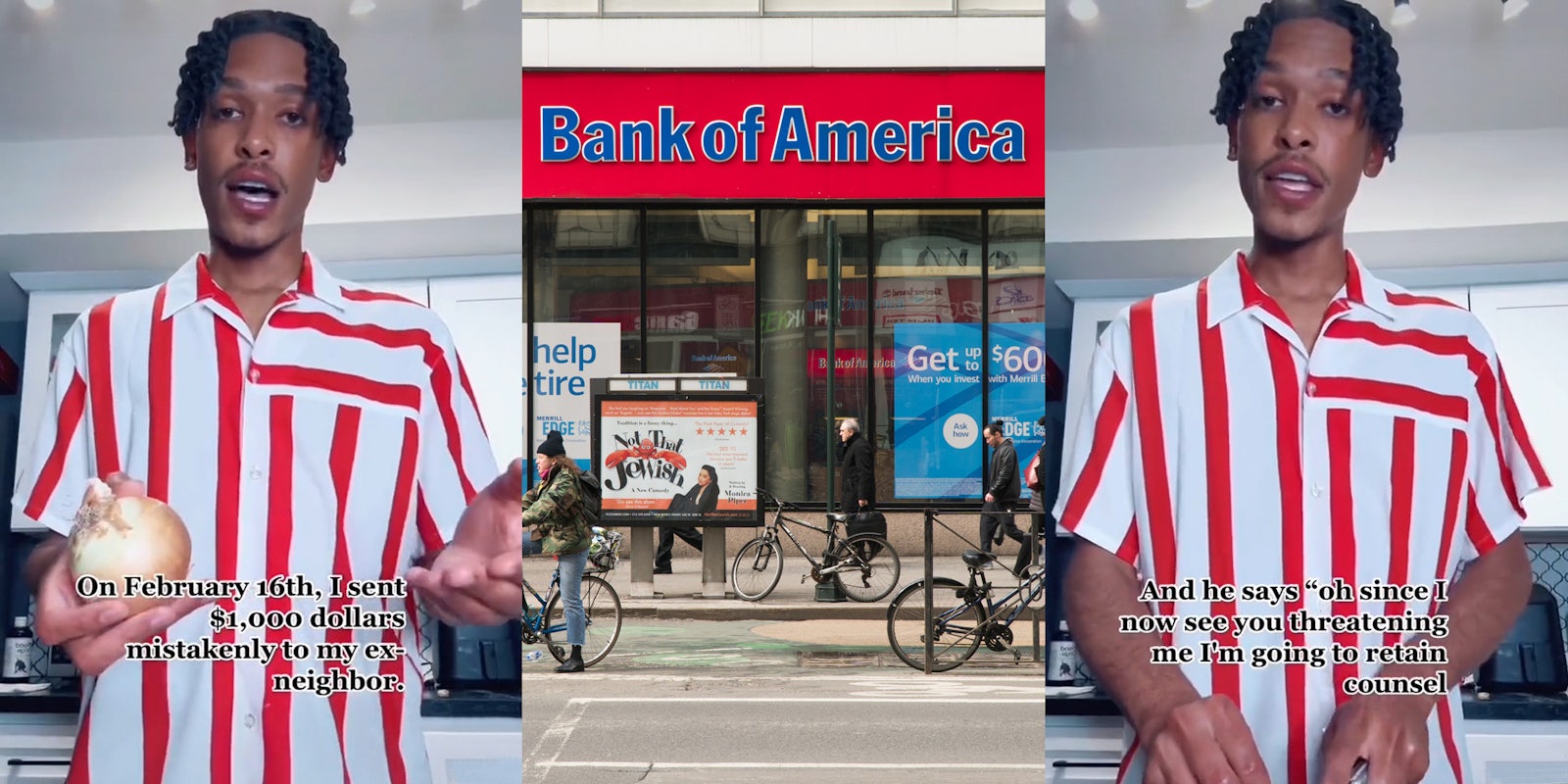TikToker Alan Peck (@alanpeck) posted a storytime about his experience dealing with a man, who Alan claims is a Bank of America employee, that momentarily left him with $1,000 less in his bank account. Although his persistence ultimately paid off, his story isn’t one that exactly inspires confidence in the country’s banking system.
@alanpeck Today’s message is to claim what’s yours, come prepared, and don’t get discouraged. If I didn’t listen to my intuition, I wouldn’t have my money today. Everyone told me no initially, but the squeaky wheel gets the grease. As of the EFTA, The Electronic Fund Transfer Act (EFTA) and Regulation E apply to an electronic fund transfer that authorizes a financial institution to debit or credit a consumer’s account. The term “electronic fund transfer” or “EFT” means any transfer of funds that is initiated through an electronic terminal, telephone, computer, or magnetic tape for the purpose of ordering, instructing, or authorizing a financial institution to debit or credit a consumer’s account. An error under EFTA and Regulation E includes any of the following: An unauthorized EFT. An incorrect EFT to or from the consumer’s account, etc Seriously, it’s so important we are all aware of the small, but very impactful details of the institutions we do business with. Big corporations tend to gatekeep useful information, and will subequently deny you help if you don’t fight for it. If you, or anyone is experiencing this or something similar, do the research and use that EFTA if it applies. ? #finance101 #banking #scam #zelle #boysaliar #efta #theft ♬ original sound – Alan Peck
Alan begins his story by stating that in February of 2022 he “mistakenly” sent money to his former neighbor Charles, using Zelle, a popular digital money transfer application that is widely used among different banks and financial institutions. The money was originally supposed to be sent to his fiancée, and Alan says that he noticed his error “within 30 minutes.”
When sending someone money through Zelle, users are warned: “Make sure you’re sending money to someone you trust, and their information is correct. Money is typically available in their account in minutes. Once you’ve sent money, you can’t cancel it.”
Alan says he then called Charles, texted him, and left him voicemails making him aware of the error. He says he waited a day before notifying his bank because he wanted to give the accidental recipient of the cash some time to respond.
Alan says he never received a response from Charles, so he notified his bank that he wanted to reverse the charge. He says a worker told him the bank was going to look into the matter and may issue him a temporary credit after conducting a 15-day investigation.
The TikToker says he still didn’t receive a response from his bank for weeks, so he followed up with a representative from the company, who informed him that there was nothing the bank could do to get his money back.
The TikToker says he took matters into his own hands and discovered Charles was a senior vice president at Bank of America on LinkedIn. He says he messaged Charles, asking him how he would like it if his employer found out that he kept the money.
Alan says that after “5 minutes” of sending the message, his former neighbor finally responded. Alan says Charles alleged he didn’t receive any of the messages and said he will check his Zelle account to see if he received the $1,000 so that he could send it back to Alan.
Alan notes that he also had reached out to Charles’ ex-wife online to find any information about the man so that he could file a police report and get the accidental Zelle transaction on record.
Alan says Charles then said he was going to retain legal counsel and that Alan was going to end up spending way “more than $1,000.”
Alan didn’t back down and says he retained a lawyer himself. Alan says he sent the lawyer all of the text messages he delivered to Charles. Additionally, Alan says Charles’ ex-wife sent him screenshots of conversations she had with her former husband, allegedly showing that he received the money and that he had to call the bank because his accounts were frozen.
The TikToker delved even further and did some research into the legalities surrounding electronic fund transfers and discovered EFTA, or, the Electronic Fund Transfer Act. He sums up the act as basically stating that unauthorized electronic fund transfers, or ones made in error, are entitled to refunds from financial institutions, and sent his bank a four-page letter informing it of the EFTA and the part it plays in his dispute with Charles and, now, possibly the bank. While his attorney said that sending the letter is probably not a good idea as EFTA is primarily used for unauthorized transactions, Alan said that he “felt in [his] gut” that he should send the letter.
Alan says the bank then forked over the $1,000. The TikToker said he shared his story to make others aware of their rights and that if they are in the right, persistence will pay off. “So don’t let anybody play with you. Know your laws and regulations and how they apply,” he said.
The Daily Dot has reached out to Bank of America via email and Alan via TikTok comment.



